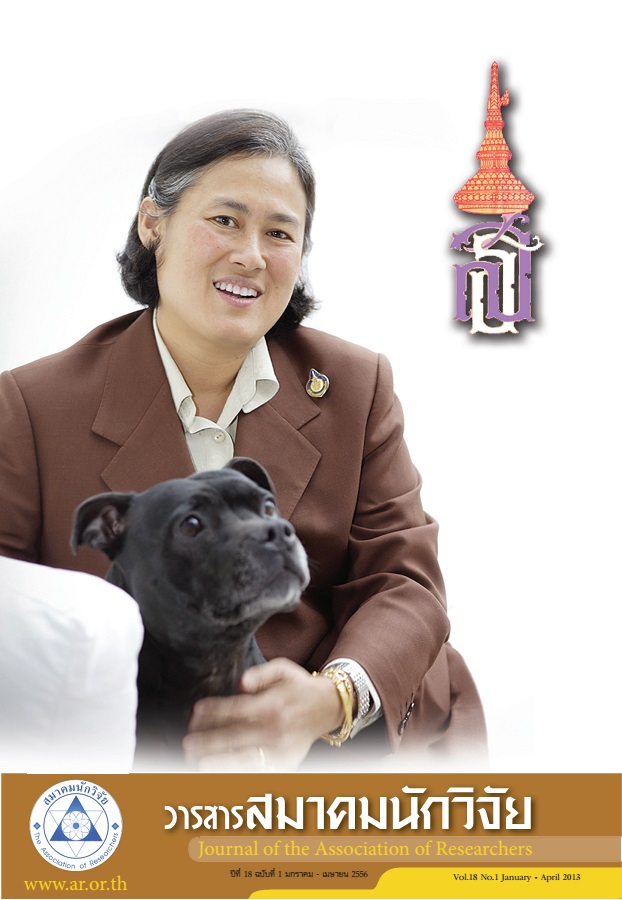THE FACTORS RELATED TO ADVERSITY QUOTIENT OF STUDENTS IN RAJAMANGALA UNIVERSITY OF TECHNOLOGY SUVARNABHUMI
Main Article Content
Abstract
The purposes of this research were 1) To study the level of family relationship, locus of control and personality of students in RajaMangala University of Technology SuvarnaBhumi. 2) To study the level of adversity quotient of students and 3) To analysis the factors related to adversity quotient of students.
The sample groups consisted of 368 students of RMUTSB. The statistics used to analyze the data were frequency, percentage, mean, standard deviation, and stepwise multiple regression analysis. The results showed that:
- 1. Students have the family relationship in “family tie, love and unity” and “family communica tion” at the high level, for "family conict” at the moderate level. Students have the locus of control in "internal locus of control” at the high level, “external locus of control” at the moderate level and Students have the personality in “agreeableness”, “consciousness”, and “openness” at the high level, and “extra version” and “neuroticism” at the moderate level.
- 2. Students have the adversity quotient over all and individual aspects at the high level. Sort by endurance dimension, origin and ownership dimension, control dimension and reach dimension.
3. “family tie, love and unity” , “internal locus of control” , “external locus of control”, “openness personality”, “agreeableness personality” and “consciousness personality” related to adversity quotient of students at statistical signicant level of 0.01 and six variables could explained at 60.3 percents.
Article Details
บทความที่ปรากฏในวารสารนี้ เป็นความรับผิดชอบของผู้เขียน ซึ่งสมาคมนักวิจัยไม่จำเป็นต้องเห็นด้วยเสมอไป การนำเสนอผลงานวิจัยและบทความในวารสารนี้ไปเผยแพร่สามารถกระทำได้ โดยระบุแหล่งอ้างอิงจาก "วารสารสมาคมนักวิจัย"
References
จิรวรรณ เจียมรัตนะ (2552), อิทธิพลของค่านิยมในการทํางานเกษตร ความเชื่ออํานาจควบคุมตนเองและความสามารถในการฟันฝ่าอุปสรรคที่มีต่อวุฒิภาวะทางอาชีพเกษตรของนิสิตชั้นปีที่ 4 ของคณะในกลุ่มเกษตรศาสตร์ วิทยานิพนธ์ วท.ม., มหาวิทยาลัยเกษตรศาสตร์
จุฑา บุรีภักดี. (2533), การพัฒนาบุคลิกภาพ. กรุงเทพฯ: วิทยาลัยครูสวนสุนันทา บุญส่ง กวยเงิน. (2549), รูปแบบความสัมพันธ์เชิงสาเหตุของปัจจัยที่ส่งผลต่อความสามารถในการเผชิญและฝ่าฟันอุปสรรค(AQ)ของนิสิตมหาวิทยาลัยนเรศวร ระดับปริญญาตรี ภาคปกติ
ชั้นปีที่ 1. วิทยานิพนธ์ กศ.ม., มหาวิทยาลัยนเรศวร, พิษณุโลก
พัชราพร วีรสิทธิ์. (2546). ความสัมพันธ์ระหว่างองค์ประกอบห้าประการของบุคลิกภาพ และความสามารถในการเผชิญและฝ่าฟันอุปสรรค(AQ) ตามหลักอิทธิบาท 4 ของเจ้าหน้าที่ที่ปฏิบัติงานอยู่ในสํานักงานประกันสังคม. วิทยานิพนธ์ วท.ม., มหาวิทยาลัยรามคําแหง
เพ็ญแข แสงแก้ว (2544), สถิติเพื่อการวิจัยโดยใช้คอมพิวเตอร์ (SPSS Version 10.0), กรุงเทพฯ: ฟันนี่
ภัทรา สง่า. (บรรณาธิการ). (2547ข), สถานภาพครอบครัวศึกษา กรุงเทพฯ: สํานักงานกองทุนสนับสนุนการวิจัย
มัณฑรา ธรรมบุศย์. (2544). เอคิวกับความสําเร็จของชีวิต. วารสารวิชาการ, 4(9); 12 – 17. รจนา คงคาลับ. (2550). ปัจจัยส่วนบุคคลและสัมพันธ์ในครอบครัวกับคุณภาพชีวิตของนักเรียน ชั้นมัธยมศึกษาตอนปลายในสํานักงานเขตพื้นที่การศึกษาชลบุรี เขต 1 จังหวัดชลบุรี วิทยานิพนธ์ ศศ.ม. มหาวิทยาลัยเกษตรศาสตร์
วิทยา นาควัชระ. (2544), เลี้ยงลูกให้เก่ง ดี มีสุข ไอคิว อีคิว เอ็มคิว เอคิว, กรุงเทพฯ: Goodbook
ศิริพร ประโยค. (2542). ความสัมพันธ์ระหว่างองค์ประกอบห้าประการของบุคลิกภาพ แรงจูงใจ ใฝ่สัมฤทธิ์กับผลการปฏิบัติงานของหัวหน้างานระดับกลางในโรงงานอุตสาหกรรม อิเล็กทรอนิกส์ กรณีศึกษา: บริษัททรีท-ไรท์ (ประเทศไทย) จํากัด. วิทยานิพนธ์ วท.ม. มหาวิทยาลัยเกษตรศาสตร์, 3
สุรางค์ โค้วตระกูล. (2537), จิตวิทยาการศึกษา, พิมพ์ครั้งที่ 3. กรุงเทพฯ: จุฬาลงกรณ์มหาวิทยาลัย
สุวิมล อุไกรษา. (2552). ความสัมพันธ์ระหว่างสัมพันธภาพในครอบครัว ความสามารถในการฟันฝ่าอุปสรรคและการป้องกันความเสี่ยงต่อการฆ่าตัวตายของนิสิตนักศึกษา มหาวิทยาลัยของรัฐในกรุงเทพมหานคร, วิทยานิพนธ์ ศศ.ม., มหาวิทยาลัยเกษตรศาสตร์,
Costa, P. T., & McCrae, R. R. (1992). Four ways ve factors are basic. Personality and Individual Differences, 13, 653–665.
Meyers, D.G. (1998). Social Psychology. Michigan: Mc Graw - Hill,
Stoltz, Paul G. (1997). Adversity Quotient – turning obstacles into opportunities. Canada: John Wiley and Sons.
Strickland, B. R. (1997). Personality Variables in Social Behavior. New Jersey: Lawrence Erlbaum Associated, Wik, K. (2006). Locus of control [online]. Retrieved June 12, 2010, from www.wik.ed.uiuc.edu


